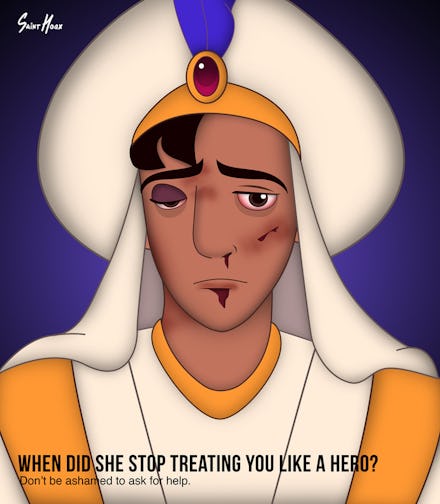Artist Uses Iconic Disney Princes to Highlight Domestic Abuse's Least Visible Victims

Saint Hoax is at it again with a new campaign this time highlighting male victims of domestic violence.
This latest series, "Prince Charmless," depicts Disney favorites like Hercules, Prince Eric and Aladdin bruised and battered with the caption: "When did she stop treating you like a Hero? Don’t be ashamed to ask for help."
"We continuously see campaigns about abused women but rarely encounter any campaign that targets male victims of domestic violence," Saint Hoax (a pseudonym), told the Huffington Post. "I only knew these statistics about abused men last month after doing an intensive research around the subject. The information wasn't out there, I had to dig for it."
Indeed the Centers for Disease Control and Prevention itself admits the difficulties facing male abuse survivors, highlighting the fact that "few services are available to male victims of intimate partner violence.”
Domestic violence — also know as intimate partner violence — has long been thought of as a problem that affects women. There's a reason for this, as women are much more likely to be seriously injured or killed by a male partner.
Research show that men, too, are victims of domestic violence, although they may not be able to admit it to authorities or even to themselves. The Mayo Clinic notes that "because men are traditionally thought to be physically stronger than women, [they] might be less likely to report domestic violence in your heterosexual relationship due to embarrassment. [They] might also worry that the significance of the abuse will be minimized because you're a man. Similarly, a man being abused by another man might be reluctant to talk about the problem because of how it reflects on his masculinity or because it exposes his sexual orientation."
Hoax could take a note from a fellow artists who has made Disney Characters queer friendly, since gay and bisexual men are also at risk for domestic violence. According to the National Coalition Against Domestic Violence, 40% of gay and bisexual men will experience abuse at the hands of a partner. When separated, bisexual men are continually at a higher risk — according to the CDC, 37% of bisexual men, compared with 26% of gay men, reported physical violence including rape and stalking.
While often uncomfortable, Hoax's use of Disney imagery to spread the word about such sobering and important issues has been an effective way to rekindle conversations. Just as with the problem of male rape, domestic abuse targeting men is almost never raised during discussions about how to prevent different types of victimization. At the very least, these PSAs serve as a reminder that all victims — no matter their gender or sexual orientation — deserve empathy and justice.
Image Credit (all): Saint Hoax